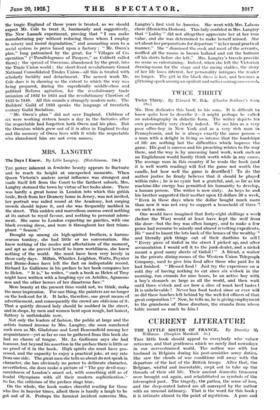MRS. LANGTRY
The Days I Knew. By Lillie Langtry. (Hutchinson. 24s.)
;THE power inherent in feminine beauty appears to fluctuate and to reach its height at unexpected moments. When Queen Victoria's austere social influence was strongest and made itself felt from the Court to the farthest suburb, Mrs. Langtry stormed the town by virtue of her looks alone. There I was hardly a great house in London into which this girlish bride, fresh from her Deanery home in Jersey, was not invited, her portrait was railed round at the Academy, lest surging crowds should injure it, and she was frequently mobbed in the street. This sudden and marvellous success owed nothing at its outset to royal favour, and nothing to personal adorn- ment. She came to London expecting no gaieties, with one black evening dress, and wore it throughout her first trium- phant " Season."
Brought up among six high-spirited brothers, a harum- scarum tomboy, she had little or no conversation. She knew nothing of the modes and affectations of the moment, and apt as she proved herself to learn worldliness, she knew nothing of the world. She must have been very lovely in those early days. Millais, Whistler, Leighton, Watts, Poynter and Burne-Jones have left the fact on indisputable record. Richard Le Gallienne in his preface to her book compares her to Helen. " It is," he writes, " such a book as Helen of Troy might have written with a laughing eye on Achilles, Agamem- non and the other heroes of her disastrous face."
Mere beauty at the present time could not, we think, make the same impression. For one thing, the painters are no longer on the look-out for it. It lacks, therefore, one great means of advertisement, and consequently the crowd are oblivious of it. That a quietly dressed lady should be mobbed in the street, and in shops, by men and women bent upon rough, but honest, flattery is unthinkable now.
Not only the leaders of fashion, the public at large and the artists burned incense to Mrs. Langtry, she soon numbered such men as Mr. -Gladstone and Lord Beaconsfield among her acquaintance—yet so far as can be gathered from this book she had no charm of tongue. Mr. Le Gallienne says she had
humour, but beyond his assertion in the preface there is little or no proof of it in the book. High spirits she must have pos- sessed, and the capacity to enjoy a practical joke, at any rate
from one side. The great men she tells us about do not speak in character, she has obviously no power to delineate character, nevertheless, she does make a picture of " The gay devil-may- careishness of London's smart set, with something still as of feudal Olympians with all their modern sophistication:, So far, the criticism of the preface rings true.
On the whole, the book makes cheerful reading for those who live in heavier times, albeit there is hardly a laugh to be got out of it. Perhaps the funniest incident concerns Mrs. Langtry's first visit to America. She went with Mrs. Labou. chere (Henrietta Hodson). This lady confided in Mrs. Langtry that " Lobby " did not altogether appreciate her at her true value, and she was determined to make herself missed. She set about her preparations for departure " in her usual practical manner." She " dismissed the cook and most of the servants, muffled all the rooms in brown holland and cut the buttons off his shirts before she left." Mrs. Langtry's travels provide no scene so entertaining. Indeed, when she left the Victorian drawing-room for the stage and the racing stables, the story of her life loses interest, her personality intrigues the reader no longer. The girl in the black dress is lost, and becomes a glittering speck among an opulent and rather outrageous crowd.










































 Previous page
Previous page